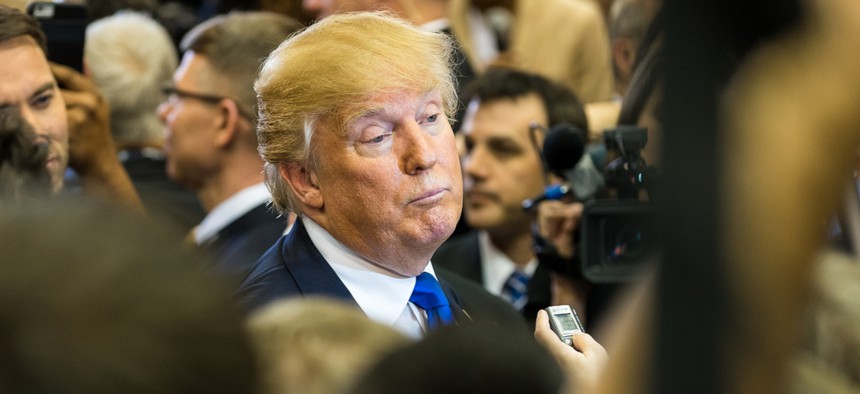
stock_photo_world / Shutterstock.com
The Perfectly Normal Ways Trump Can Enrich Himself as President
The president-elect's control over conventional economic policy could be worth more money than any conflict of interest.
Along with the many unprecedented problems they create, Donald Trump’s conflicts of interest, as with so many other things, illustrate in striking fashion an existing flaw in American democracy. The problem is corruption: the potential for elected officials to take actions that benefit themselves, their family, their friends, or their business associates rather than the country as a whole.
Donald Trump’s real-estate, licensing, and entertainment empire throws the problem into stark relief. Foreign leaders could give Trump’s businesses abroad sweetheart deals in order to curry favor with the leader of the free world. (The latest plan is for the Trump Organization to donate to the U.S. government “profits” from transactions with foreign states, but that’s only a minimal constraint.) Domestically, any number of government policies—the minimum wage, overtime rules, and so on—could be designed to benefit the Trump Organization.
Putting the Trump Organization in a trust is hardly even a fig leaf, since the beneficiary of the trust would most likely be the president’s children (or Trump himself), and he would still have an interest in doing favors for his family. Even if his company were placed in a blind trust, the president-elect would retain the knowledge he already has of his assets, and could see which assets were sold and which were still part of his holdings. Selling off the businesses now, even at fire-sale prices, would be a better solution. But it is naive to think that doing so would completely eradicate his conflicts of interest.
History shows that corruption rarely comes in black and white; it thrives on shades of gray. Did Halliburton get a multi-billion dollar, no-bid contract to operate Iraqi oil wells because it was the best deal the government could get, or because Vice President Dick Cheney wanted to help the company he had led for five years, and in which he still held stock options? Hank Paulson placed his assets in a blind trust when he became treasury secretary—but was that enough to make him truly disinterested in the fate of Goldman Sachs, the bank where he had worked for more than 30 years, during the financial crisis of 2008? Sophisticated investors even seem to expect that powerful officials will favor companies with which they have relationships: According to research by Daron Acemoglu, Simon Johnson, Amir Kermani, Todd Mitton, and me, financial institutions with connections to Tim Geithner enjoyed extraordinary stock-price gains when he was nominated to be treasury secretary in November 2008.
The potential to use public power to further private interests goes far beyond a president cutting a good deal for his own company. In fact, the single biggest thing Donald Trump could do to enrich his family is something that has nothing to do with his business interests: repealing the estate tax.
Though Trump has never disclosed his precise net worth—Forbes puts it at $3.7 billion—his family stands to lose 40 percent of it to the estate tax. Put another way, eliminating the tax would increase his family’s after-tax wealth by two-thirds—more than $1 billion, based on the estimate from Forbes. It’s hard to imagine anything the president-elect could do that would increase the value of his businesses by that much.
Trump will be able to boost his family’s wealth without the slightest hint of impropriety, because estate-tax repeal has been a Republican Party priority for years. But why is getting rid of a tax that affects only the richest 0.2 percent of families at the top of the Republican majority’s to-do list? Because, as the political scientists Martin Gilens and Benjamin Page have shown, our political system responds to the preferences of the very wealthy, not those of ordinary people.
Of course, proponents wouldn’t describe repealing the estate tax as a giveaway to the very rich. Instead, from President-elect Trump and House Speaker Paul Ryan on down, they argue that, because it only affects money a person doesn’t use during his or her lifetime, the estate tax discourages savings, so repealing it will increase savings and investment, turbocharging economic growth. Economists who have surveyed the recent research, such as Eric Toder and Kim Rueben at the nonpartisan Tax Policy Center and Jane Gravelle and Donald Marples at the Congressional Research Service, however, find that the evidence for this theoretical proposition is flimsy at best. This type of naive or disingenuous belief that the world operates according to the dictates of Economics 101 serves to disguise the interests of wealthy politicians and their even wealthier donors as sound economic policy. (And estate-tax repeal is only the tip of the iceberg. According to research by the Tax Policy Center, eliminating the estate tax would cost $174 billion over the next 10 years; Trump’s proposed 15 percent tax on corporations and other businesses is worth $3.2 trillion.)
None of this is to say that wealthy individuals are incapable of pursuing economic policies that benefit the public good; indeed, many have, historically. But the opportunity for self-enrichment is real, and it requires leaders who are committed to differentiating between the public’s interests and those of their donors—or themselves.
It would be an important step toward resolving the president-elect’s conflicts of interest if he were to sell his businesses. But the prospect of a company owned by a sitting president is only the most naked manifestation of the “rigged” system against which Trump himself campaigned. Ultimately, the benefits the president-elect could extract for his own mid-sized company are dwarfed by the favors that the new administration can do for its core constituency of billionaires and multi-millionaires—including Trump himself.






